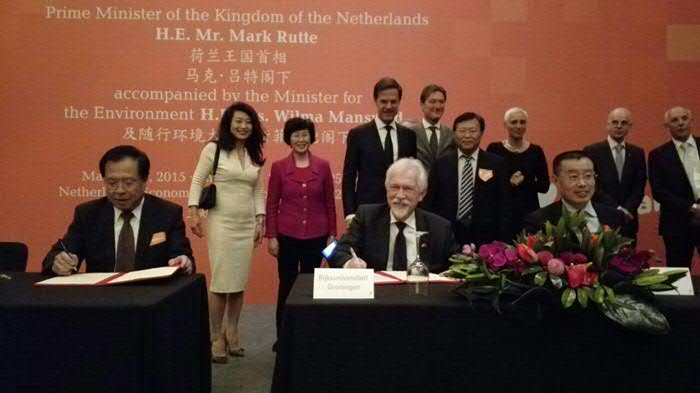No plans for Radboud campus in China
-
 Foto: Hans-Johnson (CC)
Foto: Hans-Johnson (CC)
The university board in Groningen wants to open a campus in China. The reason for that – decreasing student numbers – is a threat to Nijmegen as well. Wessel Meijers, head of internationalisation in Nijmegen, does not think a satellite campus is the solution.
There is a wall between Groningen and China. This week, the participation of the Rijksuniversiteit Groningen (University of Groningen) would vote on opening a ‘Groningen’ campus in the Chinese city Yantai. That turned out to be useless, when the staff- and student faction already said beforehand that they were not going to agree with the plans. The board dismissed the vote and is now thinking about a new proposal.
The reason that the board is so keen on a Chinese adventure is, among other things, that Groningen can not count on a sustainable, big influx of students. Chairman of the board Sibrand Poppema told the local magazine Universiteitskrant: ‘The number of students in the Netherlands decreases and the competition with other universities increases.’ He added a warning: ‘If we don’t do anything special, we move backwards.’ In other words: international students can give Groningen some air.
Exciting
Radboud University finds itself in the same situation as the University of Groningen, Wessel Meijer, head of the international office, knows. ‘The demographic shows that eventually, less students from the region will come to Nijmegen. On top of that, students focus more on the west of the Netherlands.’ To survive, you either have to come up with something new, or accept that you will decrease in size, he acknowledges.
‘It is an extreme instrument, building a campus in a country with a completely different culture’
So, has he been on an exploration trip to China, or maybe Brazil or India, to look for a good place for a second Radboud campus? Meijer can be clear about this: he has not, and no such trip is planned. ‘Opening a second campus abroad is a completely different kind of internationalisation than we have discussed so far.’
Meijer does watch Groningen’s Chinese adventure with interest and amazement. ‘I personally think it is quite an extreme instrument, building a campus in a country with a completely different culture, partially for the local market. By doing that, a university acts like a holding or a multinational.’ On the other hand: ‘It is exciting, they do have guts.’
Prediction
In the upcoming months, Radboud University is working towards a new internationalisation strategy, for the period 2020 – 2025. The international office organises meetings to collect input from the faculties. Meijer: ‘My prediction is that there will be no plans in there for a satellite campus.’
Meijer does not see the added value for Radboud University, in spite of the negative demograpic trend. ‘Of course we also want to become more international. But what do you need such a campus for? For the exchange of students? You can also do that by befriending other universities, like we do.’

China
However, a trip to China has been planned, with chairman Daniël Wigboldus as a member of the delegation. We should not search too much behind that, says Meijer. ‘We make a trip like that every year. This year, we happen to go to China. There, they really take you seriously after your chairman or rector has visited.’
That the academic freedom of China is limited – one of the objections the Groningen participation board has against the campus in Yantai – is apparently no obstruction for a symbolic visit like this one. Stil, Radboud has been holding back towards China in the past, Meijer thinks, especially when recruiting Chinese students. ‘That had to do with the big differences in language, culture and academic culture, including the limited freedom. This does result in the fact that within the Netherlands, we are the education institution with the smallest amount of studying Chinese students.’
That restraint is disappearing, says Meijer. ‘By now, the quality of many Chinese universities and research institutes is very good. But a Radboud Campus in China? I do not see that happening in the upcoming years.’




Stijn schreef op 1 september 2017 om 19:55
The argument that influx of Dutch students will decrease is one I often hear. However, the only statistic I have ever seen in this topic prospected a 2 percent decrease for the upcoming 10 years. Such a small decrease does not, in my opinion, justify any action. I invite Wessel Meijers to share more recent or extensive numbers.
Stijn schreef op 1 september 2017 om 22:47
*the influx
*on this topic